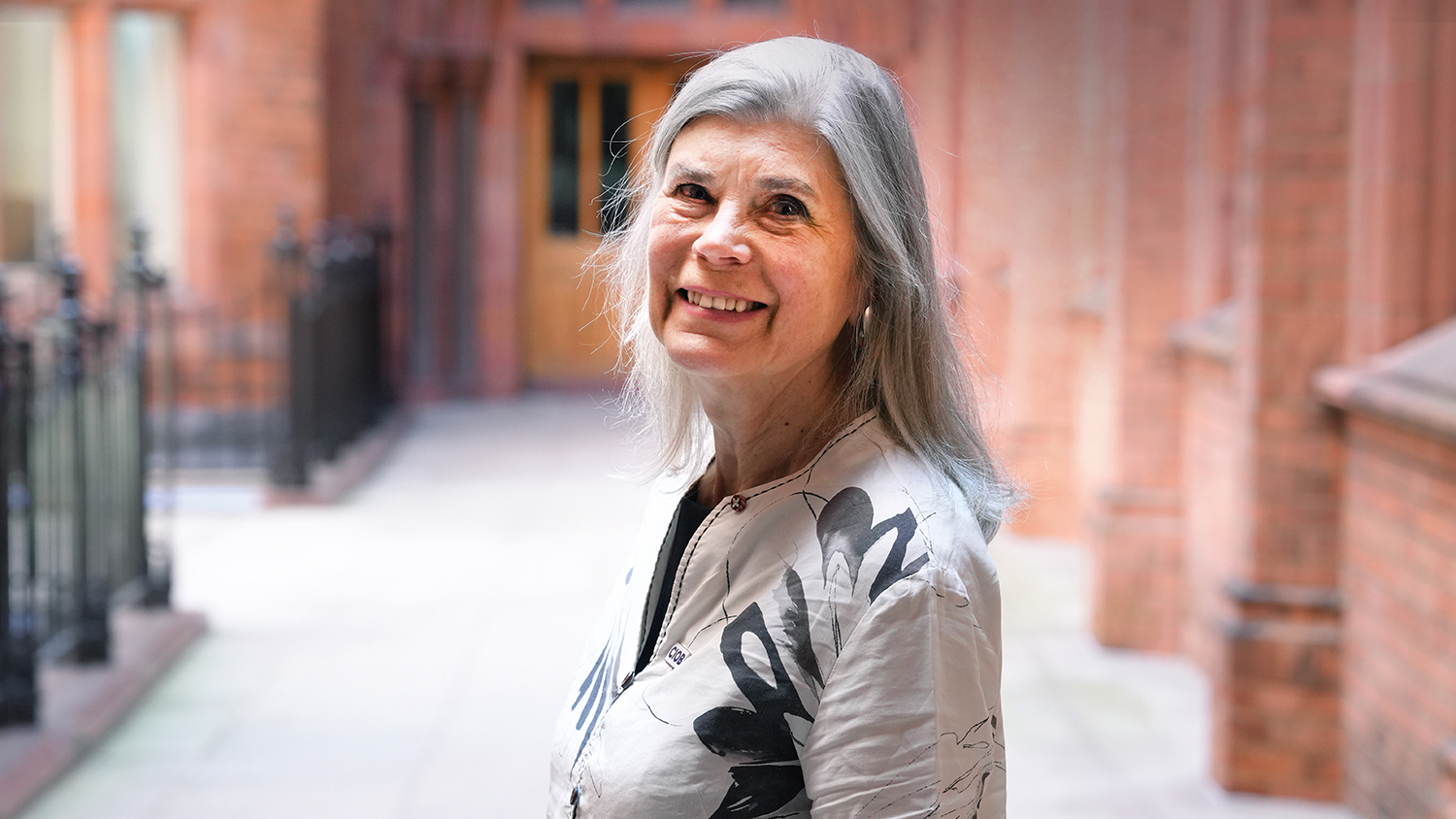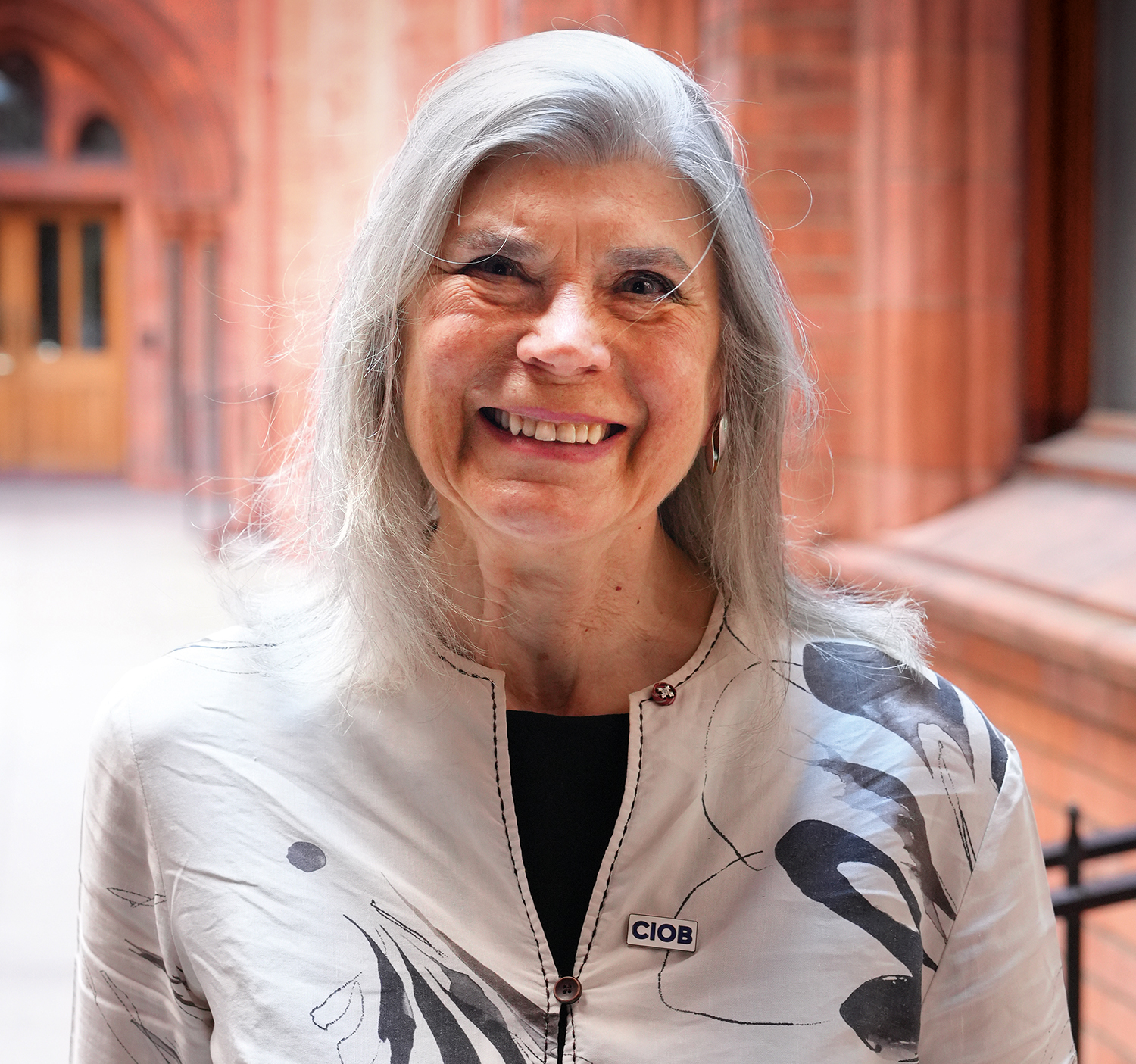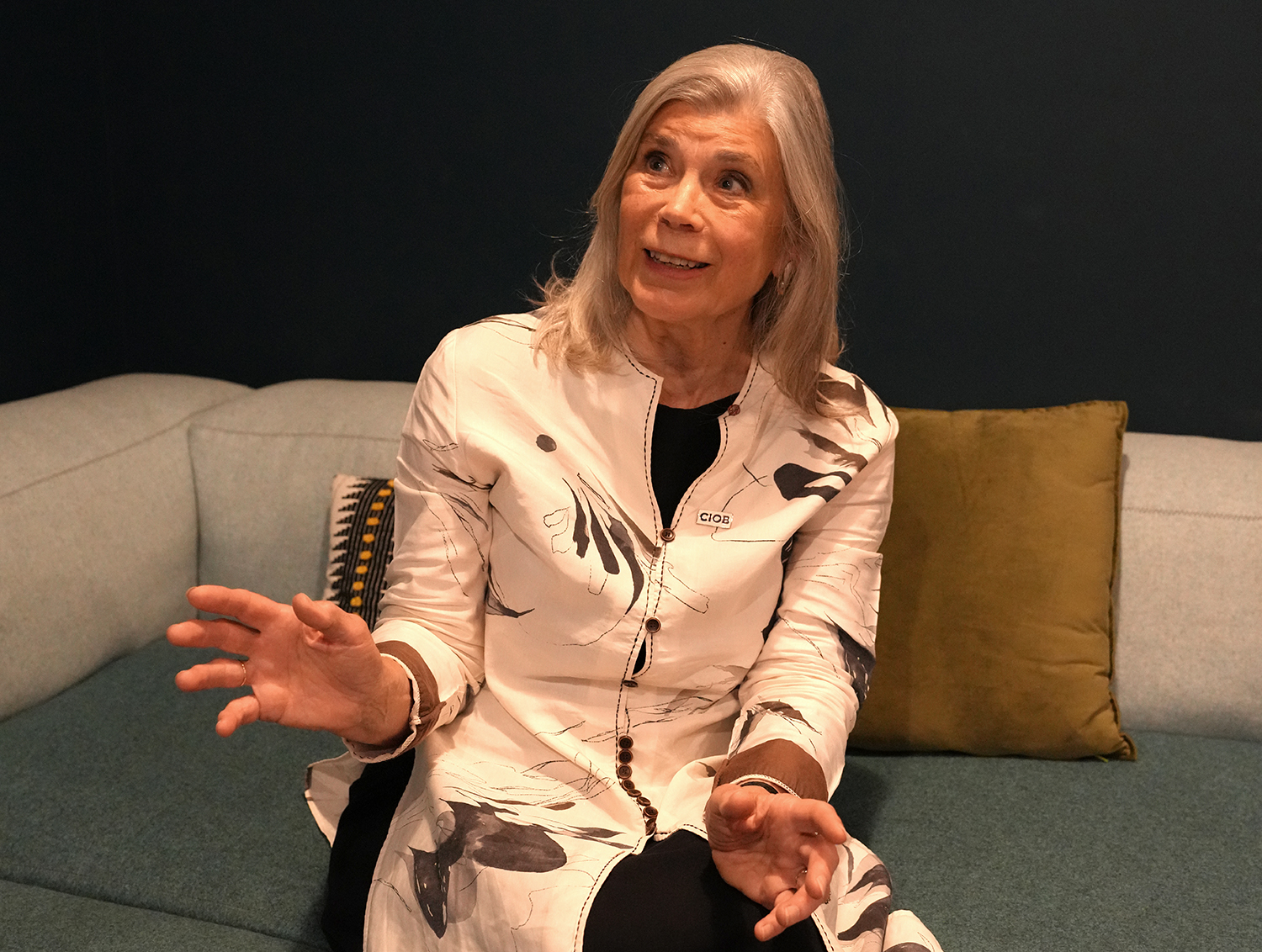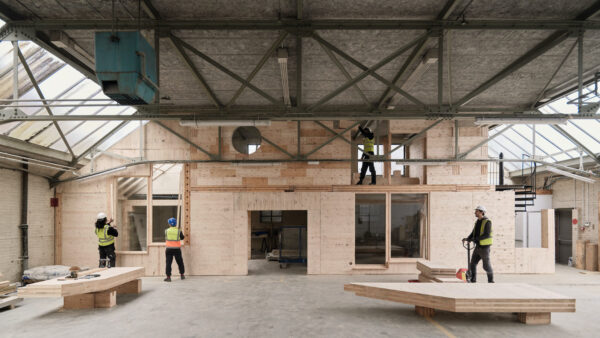
Collaboration is the theme of Sandi Rhys Jones’s term as CIOB president – and that means encouraging built environment professionals to reach out beyond the construction ‘silo’. Will Mann hears her plans. Photography by Peter Haddock.
“Listening is a great way to effect change,” says new CIOB president Sandi Rhys Jones OBE. “As a mediator I learned the power of asking the right question, and then being quiet, and allowing the other person time to think of their answer. As somebody who tends to talk rather a lot, it was a salutary lesson for me!
“But that is how collaboration works. It is how we gather evidence, how we learn lessons, how we find the answers. And we need to listen to as many voices as possible, because the built environment affects everybody, as illustrated by the challenges we have with building safety and net zero.”
Collaboration will be the main theme of Rhys Jones’s presidency, which starts this month. She brings to the role a rich and varied CV, which takes in experience working for contractors, clients, suppliers and government. She received an OBE in 1998 for her work promoting women in construction, a topic she is still speaking passionately about a quarter-century later.
Her presidential term coincides with the start of CIOB’s new five‑year corporate plan, and she sees collaboration drawing on each of its three themes, as well as the overarching idea of ‘modern professionalism’.

Sandi Rhys Jones OBE FCIOB
Owner, RhysJones Consultants, 1976-present
Leader, National Mentoring Programme, Association of Women in Property, 2011-22
Non-executive director roles: EnviroBuild, 2017‑20; EngineeringUK 2008-14; Simons Group, 2002-09; Docklands Light Railway, 1998-2000
Director, Kennington Place Management, 2001-21
Deputy chair of trustees, Royal Marines Museum, 2002-12
Deputy chair of trustees, UK Resource Centre for Women in SET, 2008-11
Fellow of the Women’s Engineering Society
Master’s degree, Construction Law and Arbitration, King’s College London, 1990-1992
Awarded OBE in 1998 for her work in promoting women in construction
Honorary doctorate, Sheffield Hallam University
She says: “I feel we have a wonderful opportunity, having identified this phrase ‘modern professionalism’, to address one of our industry’s key challenges which has concerned me for years – and that is, what do we mean by professionalism and how do we embed it throughout the industry?
“Professionalism with a capital P has traditionally implied becoming chartered, having membership of a particular group with specific competencies and commitments. But modern professionalism provides the opportunity to increase engagement and recognition with everybody in the delivery team, not simply a chartered professional. Who wants an unprofessional person delivering materials or providing site trades and crafts?
Valuing technical level of competence
“The recent introduction of the Technical CIOB membership is a great demonstration of the institute offering and valuing a technical level of competence, and also the importance of the apprenticeship routes. A modern professional construction manager can create the collaborative environment that improves performance – and challenge where required, too.”
One of the corporate plan themes is the skills gap, and Rhys Jones is delighted by the prospect of working with the institute’s Tomorrow’s Leaders group.
“It provides an excellent forum where we can listen to the ideas of younger people and recent entrants to the industry,” she says. “That’s particularly important for professional institutions, because, as an engineer once said to me at an international conference, ‘It’s wonderful to see everybody again, but you do begin to feel you’re in a room full of grey beards and denture suckers’.
“So how do we change that? We need to make sure the Tomorrow’s Leaders are recognised and seen. Mentoring is brilliant for that – not simply coaching to achieve specific objectives but broader cross-disciplinary and reverse mentoring.
“But we must ensure that when Tomorrow’s Leaders are listened to, they feel it actually progresses their careers. We’ve lost too many built environment graduates to other industries – and we need convincing ambassadors to encourage more people to join. So again, it’s about listening to those voices we might not have done in the past and, importantly, ensuring they have the confidence, skills and opportunities to share their views and experiences with others.”
Quality and safety
Linking the skills gap with another corporate plan theme – quality and safety – is a campaign Rhys Jones is spearheading during her presidency: #PPEthatfits, which tackles construction’s inadequate provision of PPE for females in the industry.
“A friend got in touch to say her daughter was one of two young women doing a welding course, and neither were equipped with protective clothing until the training was almost complete,” she recalls. “And then I started hearing similar things from other people in the industry about the difficulty of being provided with appropriate PPE. So CIOB did a survey and 46% of respondents said the PPE they were given on site did not fit properly.
“How can it be, in 2023, that you have women wanting to work in construction roles – and we can’t provide them with the right protective equipment?

Sandi Rhys Jones on…
SMEs
“Major contractors have money, resources and time, whereas SMEs are deciding whether they can afford to even get on a framework. The CIOB can provide a valuable support role here; let’s help SMEs become more fleet of foot.”
Sustainability
“CIOB past president Michael Yam has done an excellent job raising awareness about net zero, but there are a lot of roadblocks ahead. Our housing stock is old but, with our conservation knowledge, surely we can solve this?”
“But this is also about compliance and safeguarding workers. If you are not properly equipped and you’re halfway up a ladder, or you’re working on scaffolding and you’re wearing gloves that are too big, or a hard hat that doesn’t fit properly, then it’s dangerous. And it’s a danger not only to you, but to the people who are working with you.”
#PPEthatfits launch
Rhys Jones launches #PPEthatfits this month, supported by a diverse group of people from across the industry, and is hopeful that manufacturers, contractors and regulators will respond proactively to the campaign “before something serious happens” on a building site.
“But also, I would like to think that – for a change – this is an issue where construction can lead the way. Wouldn’t it be good if we could demonstrate to other industries like manufacturing, oil and gas – even the world of sport – that our industry is seriously addressing the issue and proposing answers to this safety problem?”
Another area of safety – building safety and quality – remains a major concern for CIOB and the construction industry and is another of the corporate plan themes.
“The two words ‘Grenfell Tower’ still rightly generate horror in me and many other people,” Rhys Jones says.
“It’s encouraging to see RIBA and CIOB working together on building safety, for example jointly publishing a guide to managing safety-critical elements in construction. We need more of that.
“It all comes back to collaboration – getting out of the silo, listening, communicating effectively and, importantly, taking a broader view on who needs to be in the room for those discussions. Then taking action in practical and measurable ways.
“’Safety by design’ was a big focus for us when I was non-executive director of the Docklands Light Railway,” she recalls. “When the stations were built, it was not simply about providing step-free access between train and platform, it was about making sure you didn’t have to exit the station down a long dark narrow alleyway at night.”
Knowledge-sharing
CIOB recently launched a new Client Guide to help the industry’s customers on issues such as building safety and sustainability. But Rhys Jones warns that the rest of construction also needs to step up.
“One of the things that used to really annoy me was the phrase, ‘we need to educate the client’,” she says. “And so the logic went, ‘then we’ll be able to do a much better job with the built environment.’
Sandi Rhys Jones on…
Mental health
“The suicide rates in the industry are shocking, and that links into people not feeling they are respected for what they do, and not being heard.”
Government
“We have had construction ministers and housing ministers constantly going through a revolving door for many years, and we no longer have a construction advisor. I would like to see more consistency and a recognition of the value of the industry at government level.”
“I think we’re moving on and recognising that, actually, it’s down to us in the industry to demonstrate what we can do and how we do it, what the assurances are and what it will cost. So, don’t let’s talk about education. Let’s talk about informing, listening and then proposing in a clear and persuasive way. Not forgetting the all-important knowledge-sharing along the way plus project reviews. The Client Guide is an excellent CIOB step in taking this forward and I am looking forward to supporting past president Mike Foy in carrying this work forward.”
Another tendency that needs addressing, Rhys Jones says, is dismissing innovative ways of working by businesses seen as ‘different’. “There is a pattern among employee-owned or privately owned businesses, who are prepared to be bolder and take a risk, compared to shareholder-owned companies.
“It used to happen with Arup for example, where they would do something innovative, and people would shrug and say, ‘Well, it’s Arup’. Willmott Dixon, Laing O’Rourke and Kier are similar. The CIOB Awards highlight this work, but it is important to find and promote many more individuals and companies, of all sizes.
“The perception of innovation can also be inhibiting – a novel and effective way of working may be essentially simple, rather than rocket science.” This is where CIOB hubs can provide the examples the industry needs.
Fear of investing in staff
Rhys Jones also worries that UK construction companies may shy away from investing in their staff for fear of losing them to competitors.
“This may be a feature of British business culture,” she explains, “where the attitude is often ‘If I train somebody, I want to be sure I keep the benefit. If I train them and they go and work for somebody else I have lost that investment’.“
She recalls reading Francis Fukuyama’s book Trust: The Social Virtues and the Creation of Prosperity, which was published in 1996, the same year the Construction Industry Board working group she chaired produced its report on diversity in response to Sir Michael Latham’s influential work Constructing the Team. “He compared the differing attitudes to training around the world, with many in Europe and Japan for example believing that if there was a culture of workforce training then everyone would benefit.
“I was also struck by his view that in an era when social capital may be as important as physical capital, only those societies with a high degree of social trust will be able to create the flexible business organisations needed. Roll on 25 years and we have all seen how Covid has dramatically changed attitudes to flexible working, for example.”
Inspiring action
But as an employer herself for many years, Rhys Jones recognises the realities of training costs, particularly for SMEs.
“We paid all fees and gave study leave, but we also had a discretionary structure under which an employee leaving within two years of completing training might be asked to reimburse a proportion. However, we as a firm generally benefited from the learning as much as the individuals themselves.
“And that’s another form of collaboration.”
Above all Rhys Jones is concerned to inspire action, to follow up on the listening and talking. Making properly fitting PPE available for women and others with particular needs, reducing the suicide rate, increasing the number and diversity of people coming into the industry, being key actors on the sustainability stage, demonstrating the competence and commitment of CIOB members and expanding the membership are all areas that Rhys Jones wants to encompass in the coming year.











